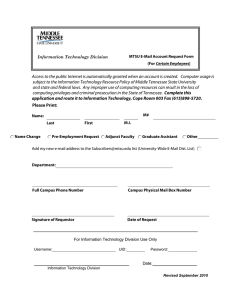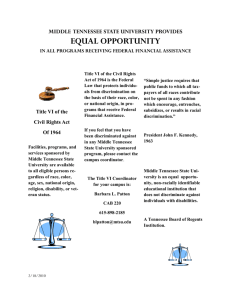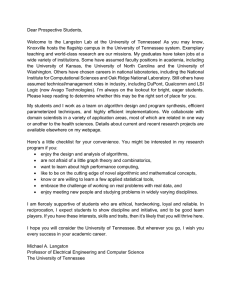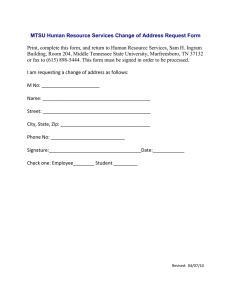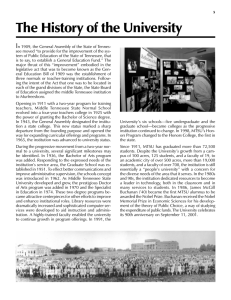Document 12272901
advertisement
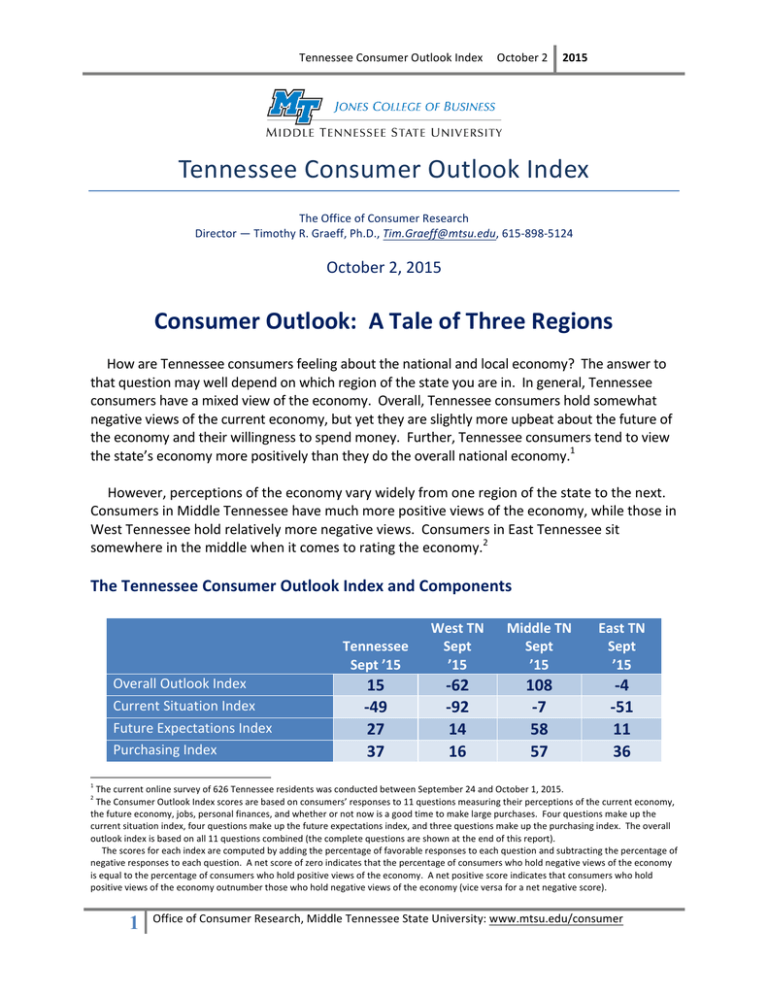
Tennessee Consumer Outlook Index October 2 2015 Tennessee Consumer Outlook Index The Office of Consumer Research Director — Timothy R. Graeff, Ph.D., Tim.Graeff@mtsu.edu, 615-­‐898-­‐5124 October 2, 2015 Consumer Outlook: A Tale of Three Regions How are Tennessee consumers feeling about the national and local economy? The answer to that question may well depend on which region of the state you are in. In general, Tennessee consumers have a mixed view of the economy. Overall, Tennessee consumers hold somewhat negative views of the current economy, but yet they are slightly more upbeat about the future of the economy and their willingness to spend money. Further, Tennessee consumers tend to view the state’s economy more positively than they do the overall national economy.1 However, perceptions of the economy vary widely from one region of the state to the next. Consumers in Middle Tennessee have much more positive views of the economy, while those in West Tennessee hold relatively more negative views. Consumers in East Tennessee sit somewhere in the middle when it comes to rating the economy.2 The Tennessee Consumer Outlook Index and Components West TN Middle TN Overall Outlook Index Current Situation Index Future Expectations Index Purchasing Index Tennessee Sept ’15 15 -­‐49 27 37 Sept ’15 -­‐62 -­‐92 14 16 Sept ’15 108 -­‐7 58 57 East TN Sept ’15 -­‐4 -­‐51 11 36 1 The current online survey of 626 Tennessee residents was conducted between September 24 and October 1, 2015. The Consumer Outlook Index scores are based on consumers’ responses to 11 questions measuring their perceptions of the current economy, the future economy, jobs, personal finances, and whether or not now is a good time to make large purchases. Four questions make up the current situation index, four questions make up the future expectations index, and three questions make up the purchasing index. The overall outlook index is based on all 11 questions combined (the complete questions are shown at the end of this report). The scores for each index are computed by adding the percentage of favorable responses to each question and subtracting the percentage of negative responses to each question. A net score of zero indicates that the percentage of consumers who hold negative views of the economy is equal to the percentage of consumers who hold positive views of the economy. A net positive score indicates that consumers who hold positive views of the economy outnumber those who hold negative views of the economy (vice versa for a net negative score). 2 1 Office of Consumer Research, Middle Tennessee State University: www.mtsu.edu/consumer Tennessee Consumer Outlook Index October 2 2015 Consumers across the state agree with respect to their negative view of the current national economy. While only 11 percent said the current national economy is “good,” 30 percent rated is as “bad.” However, Tennessee consumers hold more positive views of the state’s economy, with 21 percent saying it is “good.” West Tennessee was the only region for which there were not more consumers rating the state’s economy more favorably than the national economy. Across the state, consumers are hopefully optimistic about the future of the economy and in their perception that now is a good time to make large purchases. The differences across the regions of the state are a matter of degree. For the future expectations and purchasing sub-­‐ indices, consumers in Middle Tennessee hold the most positive views, followed by those in East Tennessee, and then those in West Tennessee. Tennessee Consumer Outlook Index Results -­‐ By Region of Tennessee Overall Index Current Situabon 150 Future Expectabons Purchasing 108 100 58 50 14 57 36 16 11 0 -­‐7 -­‐50 -­‐100 -­‐150 -­‐4 -­‐51 -­‐62 -­‐92 West TN Mid TN East TN Why Measure Consumers’ Outlook? Consumer spending makes up two-­‐thirds of the American economy. Therefore, knowing how consumers feel about the economy and their personal financial situation gives business leaders insight into potential changes in the economy. As consumers become more optimistic about the economy, this can have positive effects on their spending decisions. Conversely, if consumers are feeling pessimistic about the economy, this can dampen their willingness to spend money. More positive consumer outlook measures can signal an increased willingness among consumers to spend, which can further add to growth in the economy. 2 Office of Consumer Research, Middle Tennessee State University: www.mtsu.edu/consumer Tennessee Consumer Outlook Index October 2 2015 Jobs, Jobs, Jobs The job market and the ease with which jobs can be found can have significant effects on consumers’ outlook. In many ways, employment is the engine that drives consumers’ willingness and ability to spend money. Unfortunately, the job market is still a concern for Tennessee consumers. Three times as many consumers believe that jobs are “hard to find” (33 percent) compared to “easy to find” (9 percent). This pattern is consistent for all three regions of the state, with consumers in West Tennessee holding the most negative views of the job market, where 43 percent said that jobs are “hard to find” versus only 6 percent who said that jobs are “easy to find.” The future of the job market seems to depend much more on where you live. For West Tennessee and East Tennessee, a greater number of consumers believe there will be “fewer job openings” in the next six months compared to “more job openings.” Alternatively, in Middle Tennessee, almost twice as many consumers believe there will be “more job openings” in the next six months (27 percent) compare to “fewer job openings” (15 percent). As with their perceptions of the economy, Tennessee consumers have relatively more optimistic views of their future personal financial situation compared to their current financial situation. Even though more Tennessee consumers said that compared to a year ago they were “worse off financially” (29 percent) than “better off financially” (23 percent), the outlook for future personal finances is much brighter. Four times as many consumers expect to be “better off financially” in the next 12 months (41 percent) than “worse off financially” (10 percent). This optimism is consistent across all three regions of the state. However, this optimism seems predicated on consumers’ ability to maintain their current employment. When asked if they would be able to survive financially if they lost their job (or primary source of income) tomorrow, relatively few consumers feel confident in their ability to do so. The majority (58 percent) responded with either “probably no” or “definitely no.” If you were to lose your job (or primary source of income) tomorrow, would you be able to survive financially? 40% 30% 20% Definitely No 37% Probably No Maybe Probably Yes 33% 22% 17% 25% 21% 21% 8% 10% 19% 15% 14% Definitely Yes 34% 7% 9% 10% 0% West TN 3 Mid TN East TN Office of Consumer Research, Middle Tennessee State University: www.mtsu.edu/consumer Tennessee Consumer Outlook Index October 2 2015 Consumer Savings For consumers to survive financially and be able to spend money on the things they need and want, they must have the wherewithal to do so. This means consumers must have adequate savings to weather any financial storms that might arise. The low percentage of consumers who report they can survive losing their jobs is likely a result of lack of savings. Almost twice as many Tennessee consumers reported “saving less” than they did a year ago (40 percent) versus “saving more” (23 percent). This general pattern is seen across the three regions of the state. Thinking about your overall level of saving, do you think that compared to a year ago you are saving more, saving less, or saving about the same as you did last year? Saving Less Same Saving More 50% 40% 30% 20% 10% 0% 42% 36% 35% 37% 20% West TN 43% 27% 33% 21% Mid TN East TN However, a desire to increase their level of saving is shared among all consumers in Tennessee. At least three times as many consumers expect to “increase” their level of saving in the next 12 months (48 percent) versus “decrease” their level of saving (14 percent). Thinking ahead, do you think that in the next 12 months, you will save more, save less, or keep your level of saving about the same as it is now? Save Less Same Save More 60% 50% 40% 30% 20% 10% 0% 35% 15% 54% 46% 44% 17% 10% West TN 34% 30% Mid TN East TN 4 Office of Consumer Research, Middle Tennessee State University: www.mtsu.edu/consumer Tennessee Consumer Outlook Index October 2 2015 Investments As with savings, investments can help to give consumers a greater feeling of wealth. Feeling wealthier, even in the absence of an increase in income, can provide comfort to consumers, perhaps even spurring them to open their wallets and spend. A rising U.S. stock market can give consumers a greater feeling of wealth as their investments and savings grow. Unfortunately, twice as many Tennessee consumers believe that in the next 12 months the value of the U.S. Stock Market will be “lower than it is today” (30 percent) versus “higher than it is today” (14 percent). Do you think that in the next 12 months the overall value of the U.S. Stock Market will be higher, lower, or about the same as it is today? Lower 50% 40% 30% 20% 10% 0% Same Higher 45% 34% 33% 45% 29% 27% 18% 14% 11% West TN Mid TN 44% 40% East TN However, Tennessee consumers are not tied solely to the U.S. Stock Market when it comes to savings and investments. More Tennessee consumers expect the overall value of their savings and investments to be “higher than it is today” (29 percent) versus “lower than it is today” (20 percent). Do you think that in the next 12 months the overall value of your savings and investments will be higher, lower, or about the same as it is today? Lower Same Higher 50% 40% 30% 20% 10% 0% 29% 21% 18% West TN Mid TN 44% 30% 27% 22% East TN 5 Office of Consumer Research, Middle Tennessee State University: www.mtsu.edu/consumer Tennessee Consumer Outlook Index October 2 2015 Consumer Spending How consumers feel about the overall economy, the job market, and their personal financial situation can have significant effects on their willingness to spend money. Not all Tennessee consumers feel the same about future spending. Concerns about the job market, reduced savings, pessimism regarding the U.S. Stock Market, and fears about not being able to weather the potential loss of a job or primary source of income have left many consumers seemingly taking a cautionary wait-­‐and-­‐see approach to their future spending plans. About one third (36 percent) expect to “spend more” than they spent last year. Another third (35 percent) expect to spend “about the same” as last year. The remainder (27 percent) expect to “spend less” than last year. These results suggest that we might not see many significant changes in overall consumer spending in the near future. Thinking about your overall level of consumer spending, do you think that you will spend more, spend less, or spend about the same as you did last year? Spend Less Same Spend More 40% 30% 20% 10% 0% 29% 35% West TN 35% 28% 36% 35% 35% 38% 25% Mid TN East TN 6 Office of Consumer Research, Middle Tennessee State University: www.mtsu.edu/consumer Tennessee Consumer Outlook Index October 2 2015 Perceptions of the Economy – In One Word Consumers were also asked to identify the one word that came to mind when they thought about the future of the overall U.S. economy. The word clouds below shows the 25 most frequently mentioned words. The larger the word, the more frequently it was mentioned. This can provide clues about the thoughts that were on consumers’ minds as they responded to the survey. West Tennessee Middle Tennessee East Tennessee 7 Office of Consumer Research, Middle Tennessee State University: www.mtsu.edu/consumer Tennessee Consumer Outlook Index October 2 2015 Perceptions of the Economy: Comparison to the Nation When compared to consumers across the rest of the country, Tennessee consumers have less positive views of the current and future U.S. economy as well as the job market. However, Tennessee consumers are more optimistic about the future with respect to their personal financial situation. The table below shows the responses from Tennessee residents to a few key questions compared to those of a recent national sample conducted by the Conference Board (www.conference-­‐board.org). Comparing Tennessee Consumers to Consumers Across the Country as a Whole Nation (%) Tenn. (%) Business conditions in the U.S. are good. 233 11 Business conditions in the U.S. are bad. 18 30 Six months from now, business conditions in the U.S. will be better. 16 13 Six months from now, business conditions in the U.S. will be worse. 8 22 Jobs are easy to find (plentiful). 22 9 Jobs are hard to find. 22 33 Six months from now, there will be more job openings. 15 21 Six months from now, there will be fewer job openings. 14 20 In 12 months my personal financial situation (income) will be better. 16 41 In 12 months my personal financial situation (income) will be worse. 10 10 3 Source: August 25, 2015, “The Conference Board Consumer Confidence Index® Rebounds.” (www.conference-­‐board.org). Office of Consumer Research, Middle Tennessee State University: www.mtsu.edu/consumer 8 Tennessee Consumer Outlook Index October 2 2015 The Psychology of Consumers The psychology of consumers can have dramatic effects on the future of the economy. Consumer spending makes up two-­‐thirds of the American economy. Decreases in consumer outlook that translate into reduced purchasing patterns can have significant negative effects on the economy. Conversely, increases in consumer outlook that translate into accelerated consumer spending can have significant positive effects on the economy. When consumers begin to feel comfortable about the future of the economy and their own personal financial situation, they will increase their spending. Such spending would then help to grow the economy as manufacturers and service providers begin to produce more and retailers begin to fill jobs to meet increased consumer demand. This type of self-­‐fulfilling prophecy is illustrated below in the Self-­‐Fulfilling Prophecy of the Consumer Outlook Cycle. The Self-­‐Fulfilling Prophecy of the Consumer Outlook Cycle Optimistic Consumer Outlook Optimistic consumer outlook leads to … Increased consumer spending, Pessimistic Consumer Outlook Pessimistic consumer outlook leads to … Decreased consumer spending, which leads to … which leads to … Retailers hire more employees and purchase more inventory from suppliers, Retailers hire fewer employees and purchase less inventory from suppliers, which leads to … which leads to … Suppliers (manufacturers) must make more products, which leads to … Suppliers (manufacturers) hire more employees, which leads to … which leads to … More retail, service, and manufacturing employees, which leads to … 9 Fewer consumers with paychecks who are able to spend, which leads to … which leads to … More optimistic consumer outlook, Fewer retail, service, and manufacturing employees, which leads to … which leads to … Growing economy, Suppliers (manufacturers) hire fewer employees, which leads to … which leads to … More consumers with paychecks who are able to spend, Suppliers (manufacturers) must make fewer products, Slowing economy, which leads to … More pessimistic consumer outlook, which leads to … Office of Consumer Research, Middle Tennessee State University: www.mtsu.edu/consumer Tennessee Consumer Outlook Index October 2 2015 The Consumer Outlook Index Business conditions in the U.S. are: Six months from now, business conditions in the U.S. will be: Business conditions in Tennessee are: Six months from now, business conditions in Tennessee will be: Jobs in your area of Tennessee are (can be): In six months, there will be ____ jobs in your area of Tennessee. Financially, how are you compared to a year ago? Financially, how will you be one year from now? Now is a ___ time to buy major household Items. Now is a ___ time to buy a house. Now is a ___ time to buy a car. Good In between Bad Better About same Worse Good In between Bad Better About same Worse Easy to find Found w/effort Hard to find More About same Fewer Better About same Worse Better About same Worse Good time In between Bad time Good time In between Bad time Good time In between Bad time Tennessee Sept. ’15 n=626 (%) West TN Sept. ’15 n=206 (%) Middle TN Sept. ’15 n=210 (%) East TN Sept. ’15 n=210 (%) 11 58 30 12 52 35 10 62 25 10 58 31 13 62 22 15 58 24 14 62 22 11 64 20 21 57 21 12 56 30 29 57 12 22 57 21 19 64 15 16 60 21 23 65 9 16 66 15 9 56 33 6 50 43 12 63 23 10 55 33 21 56 20 20 52 24 27 55 15 17 61 21 23 48 29 19 48 33 27 48 25 22 48 30 41 45 10 44 41 12 46 44 6 35 50 12 23 49 19 21 43 25 25 53 13 21 49 19 41 33 19 41 29 24 44 30 19 38 40 15 27 49 16 23 49 20 35 43 15 23 56 12 10 Office of Consumer Research, Middle Tennessee State University: www.mtsu.edu/consumer Tennessee Consumer Outlook Index October 2 2015 Consumer Spending, Saving, and Investments Compared to last year, I will spend: Compared to last year, I am saving: In the next 12 months, I will ___ my level of saving. In the next 12 months, The value of the stock market will be: In 12 months the value of my savings and investments will be: If I lost my job, I would survive financially: More About the same Less More About the same Less Increase Keep it the same Decrease Higher About the same Lower Higher About the same Lower Definitely yes Probably yes Maybe Probably no Definitely no Tennessee Sept. ’15 (%) West TN Sept. ’15 (%) Middle TN Sept. ’15 (%) East TN Sept. ’15 (%) 36 35 27 35 35 29 35 36 28 38 35 25 23 35 40 20 35 42 27 37 36 21 33 43 48 33 14 46 35 15 54 30 10 44 34 17 14 41 30 18 33 34 11 45 27 14 45 29 29 43 20 29 44 21 30 40 18 27 44 22 8 13 19 23 35 8 14 17 22 37 7 15 21 21 33 10 9 19 25 34 11 Office of Consumer Research, Middle Tennessee State University: www.mtsu.edu/consumer Tennessee Consumer Outlook Index October 2 2015 About the Survey The results reported here are based on online surveys of 626 randomly selected adult residents of Tennessee. Online surveys were conducted between September 23 and October 1. Using the panel sampling services of Qualtrics.com, a stratified sampling procedure was used to ensure an equal representation of consumers from each region of the state. With a sample of 626 people, we can say with 95% confidence that the amount of survey error due to taking a random sample instead of surveying all members of the population is ± 3.9%. Other factors such as problems with question wording and question interpretation can also introduce additional bias or error into the results. Results from the Tennessee Consumer Outlook Surveys can be compared to national consumer surveys published monthly by the Conference Board (www.conference-­‐board.org). This report is also available on the MTSU Office of Consumer Research web page (www.mtsu.edu/consumer). The Consumer Outlook Index is based on all 11 survey questions outlined below. The score is computed by adding the percentage of positive responses to each question and subtracting the percentage of negative responses. The Current Situation Index is based on questions 1, 3, 5, and 7. The Future Expectations Index is based on questions 2, 4, 6, and 8. The Purchasing Index is based on questions 9, 10, and 11. For further information about the Office of Consumer Research at Jones College of Business, contact Timothy R. Graeff, Professor of Marketing and Director, Office of Consumer Research (615-­‐898-­‐5124; Tim.Graeff@mtsu.edu). 12 Office of Consumer Research, Middle Tennessee State University: www.mtsu.edu/consumer Tennessee Consumer Outlook Index October 2 2015 The Tennessee Consumer Outlook Index [C] = included in the Current Situation Index [F] = included in the Future Expectations Index [P] = included in the Purchasing Index 1. [C] Turning first to business conditions in the country as a whole, would you say that business (economic) conditions in the country as a whole are good, bad, or somewhere in between? 2. [F] And how about 6 months from now—do you expect that in the country as a whole business (economic) conditions will be better than they are today, worse than they are today, or just about the same? 3. [C] Now thinking about Tennessee, would you say that business (economic) conditions in the state of Tennessee are good, bad, or somewhere in between? 4. [F] And how about 6 months from now—do you think that business (economic) conditions in the state of Tennessee will be better than they are today, worse than they are today, or just about the same? 5. [C] Now turning to the availability of jobs in Tennessee, would you say that jobs in the area of Tennessee where you live are easy to find, can be found with effort, or are hard to find? 6. [F] How about in the next 6 months—do you think that in the area of Tennessee where you live there will be more job openings than there are now, fewer job openings than there are now, or about the same number of job openings? 7. [C] We are interested in how people are getting along financially these days. Would you say that you, and any family members living with you, are better off financially than you were a year ago, worse off financially than you were a year ago, or about the same? 8. [F] Now looking ahead, do you think that 12 months from now you, and any family members living with you, will be better off financially, worse off financially, or about the same? 9. [P] About the big things people buy for their homes—such as furniture, a refrigerator, stove, television, and things like that—generally speaking, do you think now is a good time for people to buy major household items, a bad time, or somewhere in between? 10. [P] How about buying a house? Is now a good time to buy a house, a bad time to buy a house, or somewhere in between? 11. [P] How about buying a car? Is now a good time to buy a car, a bad time to buy a car, or somewhere in between? 13 Office of Consumer Research, Middle Tennessee State University: www.mtsu.edu/consumer
